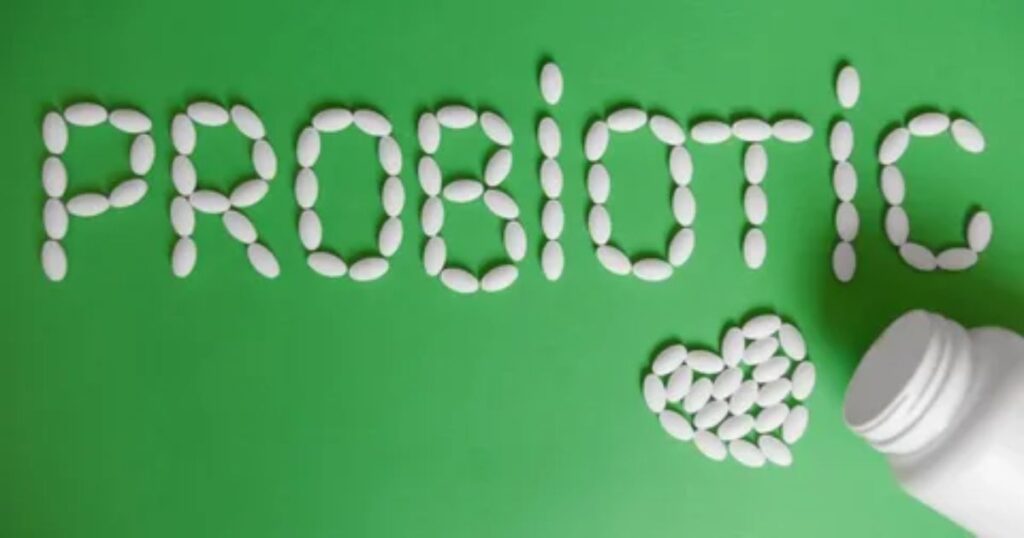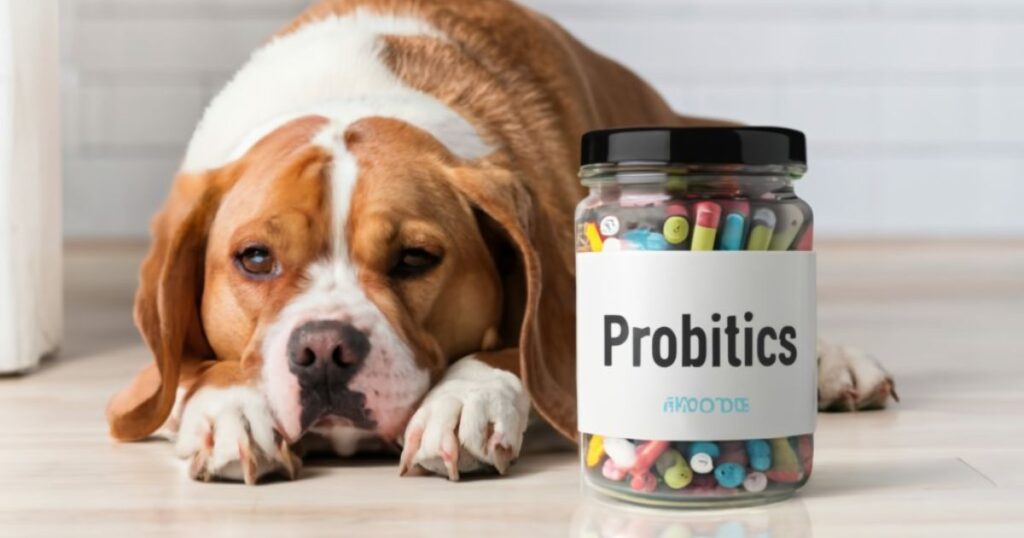Probiotics are good bacteria for Dogs. Dogs and other animals have lots of them in their stomachs. These bacteria help fight off infections make their immune systems stronger and break down food. They also help make important vitamins and nutrients. All of these bacteria together make up what we call the microbiome and for a dog to stay healthy it needs a healthy microbiome. They contain live cultures that promote stomach health of Dogs.
The probiotics for dogs are supplements containing good bacteria that help with digestion and overall health. The bacteria in probiotics are similar to the ones found naturally in a dog’s gut. They can come in various forms including powders, capsules, or chews. The supplements are given to dogs to improve their gut health and strengthen their immune system. They can also help with issues like diarrhea, constipation, or gas. Probiotics work by bringing back the balance of good bacteria in the stomach which can be disrupted by factors like illness, stress, or diet changes.
It’s essential to choose high-quality probiotics specifically designed for dogs as human probiotics may not be suitable for them. Incorporating probiotics into a dog’s diet can contribute to their overall well-being and digestive health. Regular use of probiotics can help maintain a happy and healthy pup. Probiotics can also alleviate symptoms of allergies and skin conditions in dogs. It’s important to consult a veterinarian before giving probiotics to a dog to ensure it’s safe and appropriate for their needs.
What Are Probiotics?

The term probiotics refers to live microorganisms that can provide health benefits when consumed. They are often referred to as good or friendly bacteria. These microorganisms can be found in various foods such as yogurt, kefir, and fermented vegetables as well as in dietary supplements. Probiotics work by helping to maintain a balance of beneficial bacteria in the gut which is crucial for digestive health. They can also support the immune system by promoting the growth of healthy bacteria in the intestines.
Probiotics may aid in the breakdown and absorption of nutrients from food. They can help alleviate symptoms of certain digestive disorders such as diarrhea and irritable bowel syndrome (IBS). Probiotics can also be beneficial for overall well-being, contributing to improved mood and energy levels. They are safe for most people to consume although individuals with weakened immune systems should consult a healthcare professional before taking probiotic supplements. Probiotics play a vital role in maintaining gut health and supporting total wellness.
Do Dogs Need Probiotics?
The debate on whether dogs need probiotics is ongoing. The digestive system of a dog is different from a human’s. It functions to digest raw meat efficiently. However, some argue that probiotics can benefit dogs. It is believed they can aid in digestion and boost the immune system. They may also alleviate gastrointestinal issues like diarrhea. It’s important though to consult a vet before giving probiotics to your dog.
Probiotics are not always necessary for every dog. It depends on various factors like age, diet, and health condition. They should be seen as a supplement, not a substitute for proper nutrition. Overuse of probiotics can lead to imbalances in the gut flora. It’s crucial to monitor your dog’s response to probiotics and adjust accordingly. While probiotics may offer benefits they should be used judiciously and under veterinary guidance.
Foods with Probiotics for Dogs
The addition of natural probiotics in a dog’s diet such as yogurt or kefir with live cultures can be highly beneficial. They contain live cultures that promote stomach health. The use of specific cultures in some brands may not ensure probiotic benefits, so it’s crucial to choose products carefully. The presence of artificial sweeteners in yogurt or kefir can pose risks to dogs’ health underscoring the importance of opting for plain varieties. They may enjoy the taste of homemade probiotics and look forward to mealtime.
The addition of probiotics to certain dog foods offers a convenient alternative for pet owners. It’s essential to select foods containing both probiotics and prebiotics to support the growth of beneficial bacteria in the gut. Temperature, air exposure, and moisture levels can impact the viability of probiotics in dog food. The manufacturing process probiotic combination and food type all impact the quality of the product and its probiotic content.
What Are the Benefits of Probiotics for Dogs?

The benefits of probiotics for dogs are numerous. They help in maintaining a healthy digestive system improving nutrient absorption and supporting overall immunity. It aids in combating gastrointestinal issues such as diarrhea and constipation. Probiotics can also alleviate symptoms of allergies and skin conditions in dogs. They assist in balancing the gut flora promoting better digestion and regular bowel movements. It can reduce the risk of infections and enhance the body’s ability to fight harmful viruses.
They contribute to fresher breath and healthier teeth by preventing the growth of plaque and tartar. Probiotics support the production of essential vitamins and enzymes necessary for proper bodily functions. It can alleviate symptoms of stress and anxiety in dogs by regulating neurotransmitters in the gut. They may also improve the absorption of medications and supplements maximizing their effectiveness. including probiotics in a dog’s diet can lead to improved health vitality and longevity.
- The benefits of probiotics for dogs are manifold.
- They aid in maintaining a healthy digestive system.
- It supports overall immunity keeping dogs healthier.
- Probiotics help in combating gastrointestinal issues like diarrhea.
- They also alleviate symptoms of allergies and skin conditions.
- It contributes to fresher breath and healthier teeth by preventing plaque buildup.
Can Dogs Take Human Probiotics?
The short answer is that it depends on the probiotic and the dog. Dogs and humans have different digestive systems, so what’s beneficial for us might not be suitable for them. It’s important to consult a veterinarian before giving your dog any human probiotics. They can advise you on the best course of action based on your dog’s specific needs. Some probiotics marketed for humans may contain ingredients that are harmful to dogs.
They might also have different strains and concentrations that could upset a dog’s stomach or even be toxic. However, there are probiotics specially formulated for dogs that are safe and effective. It’s crucial to choose products designed specifically for canine digestion. These products often contain strains of bacteria that are beneficial for dogs’ gastrointestinal health. While dogs can sometimes benefit from probiotics. it’s essential to use ones made specifically for them and to consult a vet before.
Also Read This Blog : Eat Your Peels Unlocking The Nutritional Benefits
Can Dogs Eat Yogurt and Other Foods with Probiotics?
The topic of whether dogs can eat yogurt and other foods with probiotics is often discussed among pet owners. The answer is yes but with some caution. Yogurt contains probiotics which are good bacteria that can benefit a dog’s digestive system. However, not all dogs can tolerate dairy products, so it’s important to introduce yogurt gradually and observe for any adverse reactions.
They should be given plain yogurt without any added sugars or artificial sweeteners. It’s crucial to check for any lactose intolerance in dogs before feeding them yogurt. Apart from yogurt other probiotic-rich foods like kefir and certain types of cheese can also be beneficial for dogs in moderation. They can help improve digestion and boost the immune system. It’s always best to consult with a veterinarian before introducing new foods into a dog’s diet to ensure their safety and well-being.
Do Probiotics Have Side Effects for Dogs?

The concern over whether probiotics have side effects for dogs is valid, but it’s important to understand that not all dogs will react the same way. The introduction of probiotics should be done gradually to observe any potential reactions. They can provide guidance tailored to your dog’s specific needs. Dogs can experience mild side effects such as gas, bloating, or diarrhea when starting probiotics.
Probiotics are generally safe for dogs when given in appropriate doses, but they may not be suitable for every dog. They can be particularly beneficial for dogs with digestive issues or those taking antibiotics. It’s crucial to choose high-quality probiotics designed specifically for dogs as human probiotics may not be suitable. While probiotics can offer many benefits for dogs it’s essential to monitor their response and seek veterinary advice if any concerns arise.
- They may experience mild side effects initially like gas or diarrhea.
- It’s crucial to consult a veterinarian before giving probiotics.
- They can provide tailored guidance for your dog’s needs.
- Probiotics are generally safe when given in appropriate doses.
- They can be particularly beneficial for dogs with digestive issues.
- It’s important to choose high-quality probiotics designed for dogs.
- They may not be suitable for every dog.
- Monitoring your dog’s response is key to seeking vet advice if needed.
What are the best Homemade probiotics for dogs?
The best homemade probiotics for dogs can be simple yet effective. The key is to introduce them gradually into your pet’s diet to promote a healthy digestive system. It can be as easy as adding a spoonful of plain yogurt to their meals. It contains beneficial bacteria that aid in digestion. Another option is kefir, a fermented milk drink rich in probiotics. They can help maintain the balance of good bacteria in your dog’s gut. It’s satisfying to know you’re taking proactive steps to support your dog’s health naturally. They may enjoy the taste of homemade probiotics and look forward to mealtime.
It’s important to ensure that the probiotics you offer are suitable for dogs and do not contain harmful additives. Fresh fruits and vegetables like carrots, apples, and bananas can also provide natural sources of probiotics for your furry friend. It’s advisable to consult with your veterinarian before introducing any new supplements or foods into your dog’s diet. By incorporating these homemade probiotics into their meals you can contribute to your dog’s overall well-being and digestive health. It’s recommended to use organic ingredients to avoid pesticides or additives. They promote a healthy gut environment for your furry friend.
Can Puppies Take Probiotics?
puppies can benefit from probiotics just like humans. It helps to maintain a healthy balance of good bacteria in their digestive system. They can be especially useful for puppies with sensitive stomachs or those who have recently been on antibiotics. It’s important to choose probiotics specifically designed for puppies as their digestive systems are different from adult dogs. These supplements come in various forms like powders, chews, or treats, making them easy to administer.
They help in digestion strengthen the immune system and may even improve skin and coat health. It’s essential to consult with a veterinarian before starting any new supplement regimen for your puppy. The digestive systems of puppies are delicate and it’s important to ensure their health. They can be given in various forms including powders, capsules, or chews, making it easier to manage to puppies. Probiotics can contribute to your puppy’s complete health and well-being. It’s essential to choose probiotics formulated specifically for dogs. It’s best to introduce probiotics slowly into a puppy’s diet to avoid any digestive upset.
Signs That Your Dog Needs Probiotics

The signs that your dog needs probiotics are subtle yet important. The first sign is a change in their digestion. It might show through diarrhea, constipation, or excessive gas in dogs. They might also have bad breath or a dull coat, indicating issues with their gut health. They could display signs of discomfort like itching, licking, or scratching excessively. Their energy levels might decrease, and they may seem less enthusiastic about their daily activities.
They could experience recurrent infections or allergies, suggesting a weakened immune system. If they’re frequently vomiting or experiencing bloating it could be another signal. Observing their behavior is crucial if they seem off or less happy than usual it could indicate a need for probiotics. Regular check-ups with your veterinarian can help confirm if probiotics are necessary for your furry friend’s well-being.
- The dog is experiencing frequent digestive issues such as diarrhea or constipation.
- It has a weakened immune system, leading to frequent illnesses.
- They exhibit symptoms of food allergies or intolerances, like itching or skin irritation.
- It shows signs of stress or anxiety, affecting their overall well-being.
- It has been on a course of antibiotics, which can disrupt the gut flora.
- They have a history of poor diet or nutrient absorption, leading to imbalance in gut bacteria.
Frequently Asked Questions
What probiotics can I give my dog?
You can give your dog probiotics specifically formulated for dogs, available in various forms such as powders, capsules, or chews.
What are the best homemade probiotics for dogs?
The best homemade probiotics for dogs include plain yogurt, kefir, and fermented vegetables like sauerkraut but always consult your vet first.
Is milk a probiotic for dogs?
Milk itself is not a probiotic for dogs but certain dairy products like yogurt can provide beneficial probiotics.
Is honey a probiotic for dogs?
Honey is not considered a probiotic for dogs but it does offer some health benefits due to its antimicrobial properties.
How to make probiotics for dogs?
To make probiotics for dogs at home you can ferment vegetables like carrots or green beans using a simple saltwater solution and allow them to ferment for a few days before feeding them to your dog in moderation.
Conclusion
The benefits of probiotics for dogs are clear making them an excellent addition to a pet’s diet. They can support digestive health boost the immune system and even improve the overall well-being of our furry friends. Probiotics play a crucial role in maintaining a dog’s health and happiness. They provide a natural and safe way to talk about various health issues from diarrhea to allergies. It’s remarkable how these tiny microorganisms can make such a significant difference in a dog’s life. They promote a balanced gut flora, ensuring optimal nutrient absorption and digestion.
Probiotics also offer a holistic approach to canine health talking about the root cause of many ailments rather than just alleviating symptoms. They contribute to a stronger immune system, helping dogs fend off infections and illnesses more effectively. It’s fascinating to see how probiotics can positively influence a dog’s overall health from their coat to their energy levels. It’s noticeable that including probiotics in a dog’s routine can lead to happier and healthier lives for our beloved pets. Probiotics have rightfully earned their place as a valuable supplement for dog’s wellness with their numerous benefits.

Hello I’m Jack Wilson An Experienced Author I’m Writing About DOGS and TRENDING TOPICS with a simplicity that Relates with readers. My writing style carries Easy wording with Natural touch which makes My writing Engaging and Easy to Read.











